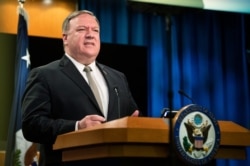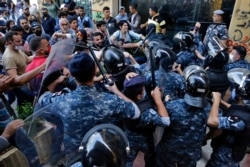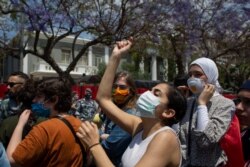With its economy continuing a downward spiral and protests reigniting, Lebanon’s crisis keeps growing and so are the warnings that the unrest could explode into a major regional crisis.
Many of those warnings have come from the United States, which historically has committed large numbers of troops – including more than 200 who were killed in the 1980s when the U.S. intervened as part of a multi-national force to stop the country’s civil war.
But Washington’s response this time has been limited, and analysts say that measured approach is rooted in U.S. fatigue in a region where it has a long history of unsuccessful ventures.
“The invasion of Iraq did not go well, our involvement in Syria has not gone well, Afghanistan is still going on, so I think the government is tired of trying to deal with the problems there,” said Larry Korb, senior fellow at the Center for American Progress, a research organization in Washington. “This is really a problem that the international community has to deal with because of the fact [of] the devaluation of the currency, the high unemployment there.”
The U.S. has sought to bring positive change with actions such as stepping up sanctions on affiliates of the Iran-backed Hezbollah, urging Lebanon’s leaders to fix its economic problems, advising the disarmament of militias, and calling on Lebanon to end its involvement in Syria, according to Danielle Pletka, a Middle East analyst at the American Enterprise Institute in Washington.
“But the United States, unfortunately, like Israel, like a lot of European countries, looks at Lebanon and just kind of throws its hands up. It’s just too much of a mess, and the effort that will be required to straighten it out is not proportional to the benefits anymore,” Pletka said. “That is a disaster not just for us, obviously, but (for) the Lebanese people.”
Recent U.S. Department of State actions on Lebanon have largely focused on urging Lebanon’s leaders to carry out economic and anti-corruption reforms that their people are demanding - and putting pressure on Hezbollah.
“Hizballah is a terrorist organization and we are supportive of Lebanon as long as they get the reforms right and they are not a proxy state for Iran in Lebanon,” Secretary of State Mike Pompeo said in a July 8 briefing. “It would be a very bad thing for the people throughout Lebanon and we hope that doesn’t happen in Beirut.”
Analyst Larry Korb said he worries that Washington’s limited approach in Lebanon could result in a greater problem across the region, especially in Syria and the Palestinian territories, where Israel is poised to annex as much as 30% of the West Bank starting this month and triggered warnings of violence.
Unrest in the Palestinian territories has historically spilled into Lebanon, where thousands of Palestinians have lived as refugees since the state of Israel was created in 1948. Additionally, the strong influence of Hezbollah has led some analysts to describe Lebanon as a satellite state of Iran.
“I think the real crisis is that nobody is paying attention to it and this could destabilize the whole region,” Korb said.
Analysts call it the biggest danger Lebanon has faced since its devastating 1975-1990 civil war.
The Lebanese pound has collapsed, poverty and inflation have increased, and unemployment is continuing to grow.
Losing hope
In June, two finance ministry advisers resigned due to growing frustration with the government’s failure to address the country’s mounting problems.
Henri Chaoul and Alain Bifani’s departures came as hopelessness grew in Lebanon, its economy continued to slip further into a major financial crisis and a senior International Monetary Fund official signaled little hope in negotiations to resolve it.
“The reasons for my resignation are an objection to the way the government deals all together with the crisis, and the path that we are taking today is reckless,” Bifani told Lebanese al-Jadeed TV.
Chaoul and Bifani had been working with the IMF since May on behalf of the Lebanese government to stabilize the economy and return it to growth, but disagreements on the financial sector’s losses and how they should be divided stymied the conversations.
IMF Managing Director Kristalina Georgieva, in a June 26 Reuters Newsmaker webcast, said it was unclear whether Lebanon’s leaders, stakeholders, and civil society can unify around reforms to stabilize its economy.
Leaderless protests
“The core of the issue is whether there can be a unity of purpose in the country that can then carry forward a set of very tough but necessary measures,” IMF Managing Director Kristalina Georgieva said. “All I can say is that we are putting our best people to work with Lebanon, but we do not yet have a reason to say there is a breakthrough.”
The finance ministry advisers’ resignations come as Lebanese citizens return to protesting and demanding changes to the current economic and political system. Demonstrators first took to the streets in October after a proposed tax on WhatsApp phone calls, which was meant to offset the country’s $83 billion debt.
The protests, leaderless, escalated and expanded with demonstrators demanding an end to corruption, sectarian rule, and unemployment.
The demonstrations dampened in the early part of the country’s coronavirus lockdown only to erupt again in June when the hopelessness of Lebanon’s unending economic problems – along with pent-up frustration caused by the lockdown – sent protesters out again. Adding to the anger was the prospect of IMF-imposed spending cuts that many saw as only adding more hardship to their lives.
Since protests began in October, Lebanon’s poverty and unemployment rates have continued to increase, the Lebanese pound plunged 80%, hitting an all-time-low and protesters have cited instances of extreme violence while in custody. Amnesty International quotes activists as saying more than 900 people have been arrested since the protests began in October.
More recently, the only demand groups have in common is to remove Lebanon’s government in its entirety, but the demonstrators have no comprehensive plan for a replacement.
Randa Slim, an analyst at the Washington-based think tank Middle East Institute, cites competing visions for the future of Lebanese politics and economics. The groups protesting the system that was put in place after the civil war in 1991-92 range tremendously, Slim said.
“That's where they were never able, and even until now, to formulate a joint agenda, and a joint set of demands, and then participate in what I believe is needed, which is a dialogue with the political elites,” said Slim.
Many of the groups leading the protests include revolutionaries and anarchists, all with a common goal of affecting change, but no common denominator when it comes to strategy or vision.
One of the groups that has been out protesting is BM or Beirut Madinati, which in Arabic translates to “Beirut Is My City” and was formed in 2016 by American University of Beirut academics. The group presented 12 men and 12 women as candidates for municipal elections, but despite winning 32,000 votes, did not win a place in the government. In October, BM decided to shift its strategy and take its calls for change to the streets.
“It's obvious for us and for all the people who really want to bring a certain change, or an embedment in the life of the country, that the ruling parties have to go,” said Hassan Ramadan, a member of BM’s citizens council.
Ramadan listed BM protesters’ five aims: removing all current government officials from office, the strict application of the Constitution of Lebanon, a completely independent judicial system, an assumption of responsibility on the part of government leaders for the demise of the economy, and a total reconstruction of the political system.
There is also the KAFEH! Movement, which advocates anarchy. Its stated goal is a decentralized society that upholds the values of freedom, social justice, egalitarianism and secularism without authority.
The Citizens in a State, or Mouwatinoun wa Mouwatinat fi Dawla, group wants to do away with Lebanon’s sectarian political system and oversee the transition to a new system.
“Our goal is to get on the negotiating table with the six or seven political sectarian leaders in the country and to be able to protect this country through forming a government with legislative powers that will be comprised of men and women with vision, with courage and with freedom from being represented by sex,” one of the group’s leaders, Rania El Masri, told VOA.
Change, but how?
Analysts say the lack of a unified set of demands and the prominence of fringe groups in the protests is working against the demonstrators because it is keeping away moderates and failing to generate mass support.
The Middle East Institute’s Slim believes the seeds of division are working to the political elites’ advantage.
“Many people who will sympathize with the demand of upending the existing political system. Many Lebanese, I mean, are reluctant to join this protest movement partly because of the lack of this clear, identifiable set of demands and long term agenda in terms of what kind of political system they want,” Slim said.
The disunity prevented the Lebanese government from receiving a $83 billion bailout as well as additional aid from other countries, according to AEI’s Danielle Pletka.
Jacob Russell in Beirut & Dale Gavlak in Amman contributed to this analysis.











